We demand responsibility from the people we lead.
What about YOU, the leader?
Do you take responsibility?
Do you recognize when you don’t?
What happens when your lack of responsibility contributes to the frustration you have with your team?
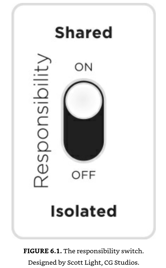 We continue exploring Compassionate Accountability: How Leaders Build Connection and Get Results by Nate Regier Ph.D. and Marshall Goldsmith.
We continue exploring Compassionate Accountability: How Leaders Build Connection and Get Results by Nate Regier Ph.D. and Marshall Goldsmith.
Turn On Your Responsibility Switch
Here are five behavioral strategies to help you turn and keep your responsibility switch on:
- Take ownership of your emotions, thoughts, and behaviors.
- Allow others to take ownership of their emotions, thoughts, and behaviors.
- Ask directly and assertively for what you want and need.
- Enforce boundaries, standards, and commitments without blaming, attacking, or threatening.
- Keep the most important thing the most important thing.
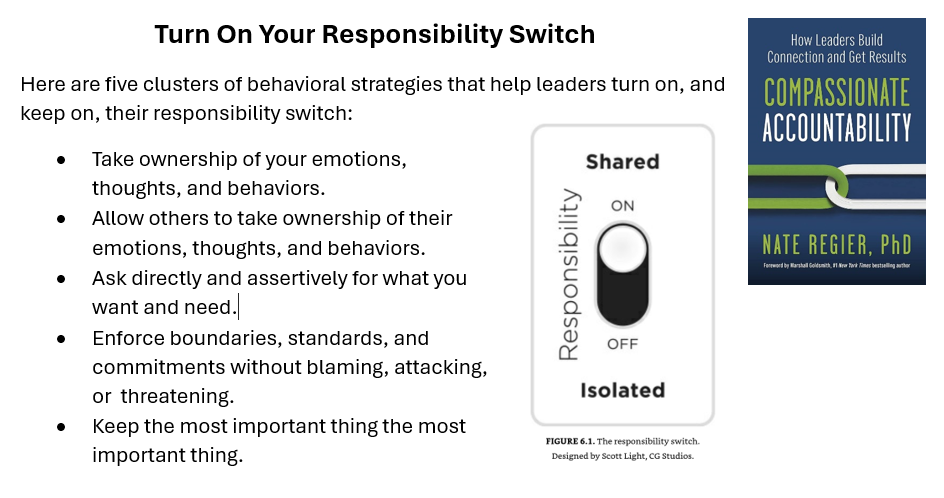 Take Ownership of Your Emotions, Thoughts, and Behaviors
Take Ownership of Your Emotions, Thoughts, and Behaviors
The author shared examples of apologies made with the responsibility switch off.
I’ve been guilty of sharing at least one of these. What about you?
Here are a few that are particularly common and comical:
- “I’m sorry if you were offended by something I said.”
- “I’m sorry for whatever I did that bothered you.”
- “Okay, fine! I’m sorry.”
- “I’m sorry. Are you happy now?”
- “I didn’t mean to, but if it makes you feel better, I’m sorry.”
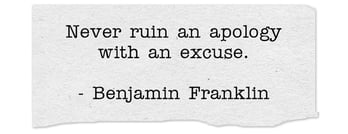 It reminds me of Ben Franklin’s “Never Ruin an Apology with an Excuse.”
It reminds me of Ben Franklin’s “Never Ruin an Apology with an Excuse.”
In contrast here are examples of good apologies with the responsibility switch on:
- “I feel embarrassed about what I said in the meeting. That comment was inappropriate and disrespectful. I am really sorry. I will watch my words more closely in the future.”
- “I am angry at myself for missing the meeting. By not being there, I held up our progress on a critical component of the strategic plan. I am sorry. What can I do to make it up to the team?”
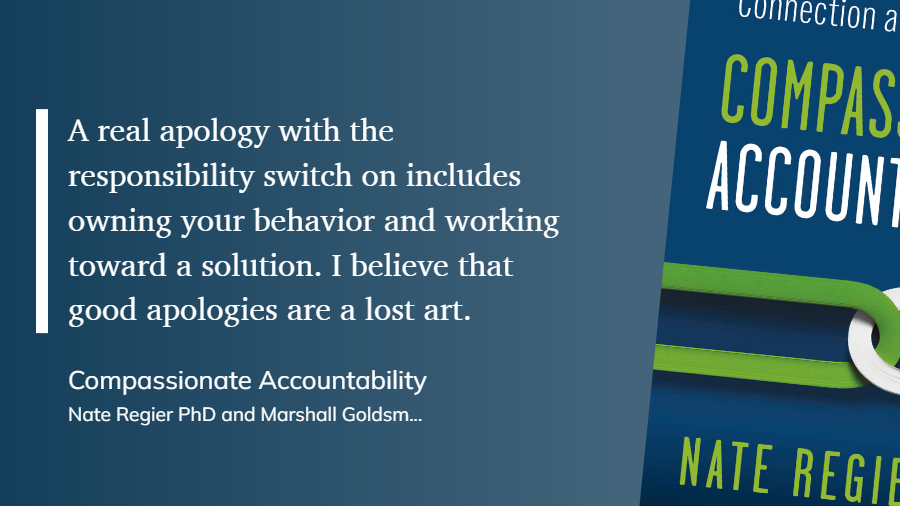 The last two examples demonstrate that the person is aware of their feelings, understands their specific damaging behavior, and seeks to make amends. They take responsibility for only their own emotions, thoughts, and behaviors. Nothing more, nothing less.
The last two examples demonstrate that the person is aware of their feelings, understands their specific damaging behavior, and seeks to make amends. They take responsibility for only their own emotions, thoughts, and behaviors. Nothing more, nothing less.
Nate Reiger provides a memorable quote, “If happiness is not about what happens to us but how we respond, then forgiveness is the ultimate act of personal responsibility.”
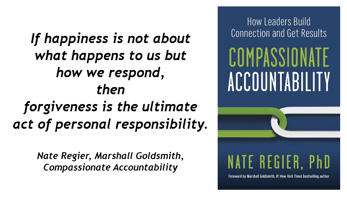 Blanchard, of the book Simple Truths of Leadership: 52 Ways to Be a Servant Leader and Build Trust.
Blanchard, of the book Simple Truths of Leadership: 52 Ways to Be a Servant Leader and Build Trust.
“Forgiveness is letting go of all hope for a better past.”
Allow Others to Take Ownership of Their Emotions, Thoughts, and Behaviors
Taking ownership of your emotions, thoughts, and behaviors doesn’t mean you don’t care about what others feel, think, and do. It simply means we don’t take it on as our own.
This changes how a leader responds to others around issues of accountability.
Validating the other person’s experience without taking it on invites them to be part of the solution. It clarifies boundaries. It might sound like one of these responses:
- Employees complain about what their coworkers are doing and want you to fix it.
- “I’m sorry about the conflict you are having with your coworker. What support do you want to be able to address this directly with her? I am willing to support you in having that conversation, but I won’t do it for you.”
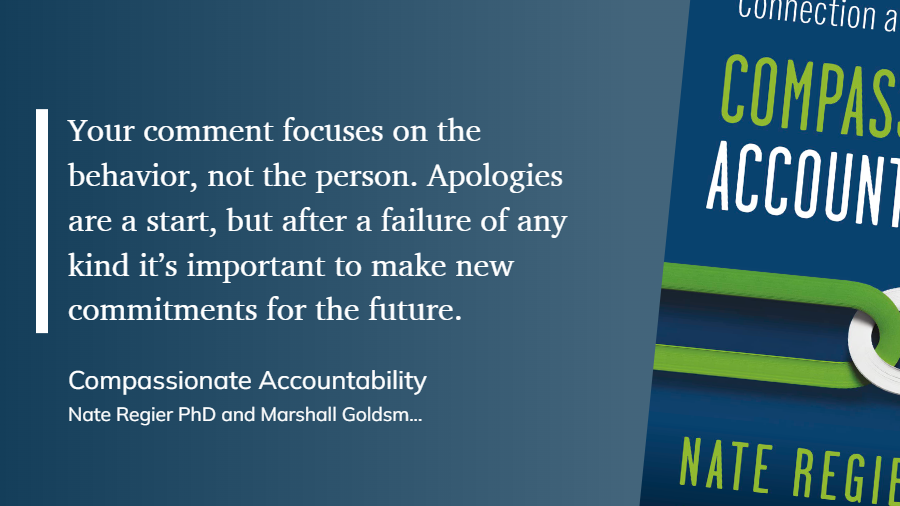
- Your boss asks you to do something that infringes on a personal boundary.
- “I know how important this is for you. Is there someone else who could join you tonight? We agreed that I can attend my son’s soccer games on Wednesday nights, and that’s tonight.”
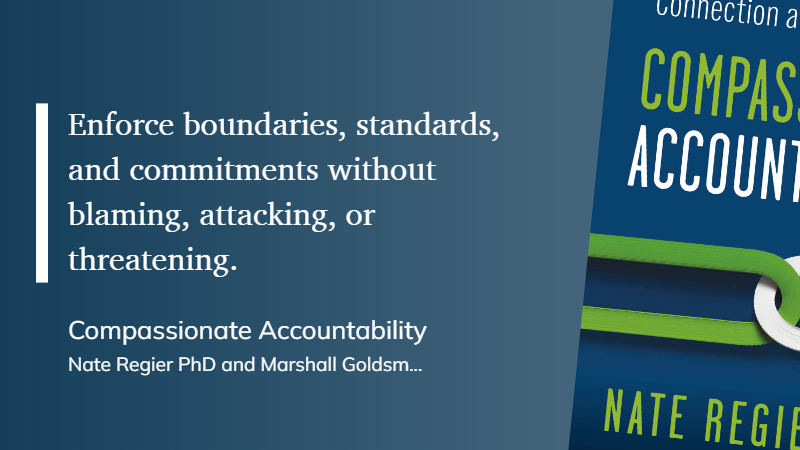
- Your children act like money grows on trees in the backyard.
- “That sounds tough. I hate it when I can’t afford something I want. What else can you do this weekend? I am not going to advance your allowance.”
These situations are difficult because they are never simple and usually involve strong emotions or a sense of urgency.
Willingness
When people make excuses or don’t seem to want to take responsibility for their emotions, thoughts, and behaviors, it might be an issue of willingness.
Marlene Chism, an expert in change and conflict, believes nothing happens without willingness. If you don’t understand this as a leader, you might have let your responsibility switch off.
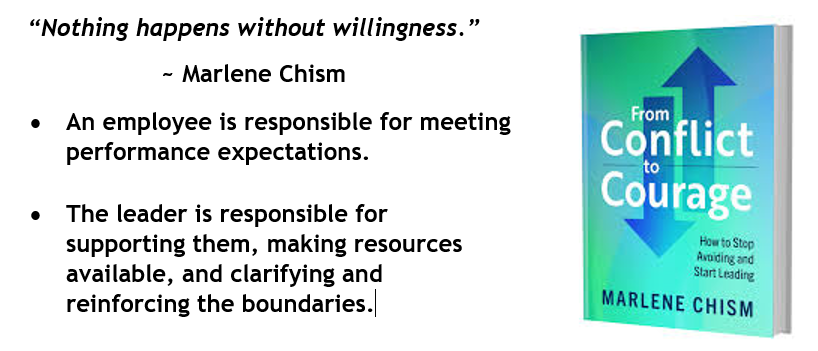 When people appear resistant, it feels easier to take over the responsibility or get into negative power struggles with them. Marlene recommends zoning in on willingness.
When people appear resistant, it feels easier to take over the responsibility or get into negative power struggles with them. Marlene recommends zoning in on willingness.
For example: A salesperson complains that they can’t meet their quota because of economic conditions, even though their peers are meeting their quota. You could focus on willingness by responding: “It is difficult in these tough times. If you could get insights and tips from your peers, would you be willing to apply them to meet your quota?”
Your child complains they need new shoes and wants an advance on their allowance. Instead of preaching to the child about saving money or complaining that they can’t afford it, imagine this response: “You are right, new shoes sure are expensive. If you had a way to earn extra money, would you be willing to do it?”
 Chism’s book, From Conflict to Courage: How to Stop Avoiding and Start Leading, helps leaders keep responsibility where it lies.
Chism’s book, From Conflict to Courage: How to Stop Avoiding and Start Leading, helps leaders keep responsibility where it lies.
An employee is responsible for meeting performance expectations.
The leader is responsible for supporting them, making resources available, and clarifying and reinforcing the boundaries.
Take ownership of your emotions, thoughts, and behaviors, learn how to allow others do to the same, ask assertively for what you need and want, enforce boundaries and commitments without blame, threats, and attacks.
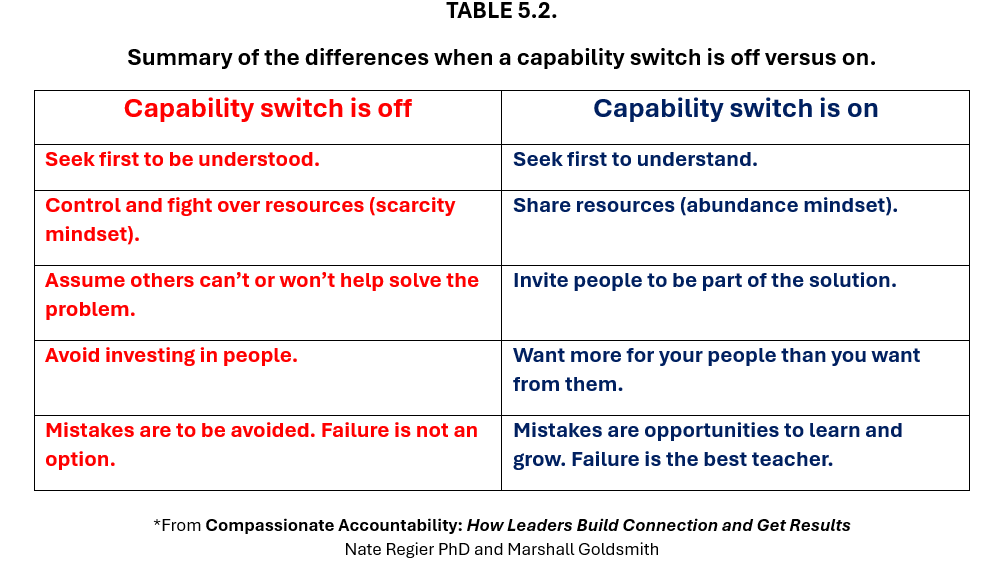 To create an environment where everyone is inspired to give their best, contact Positioning Systems to schedule a free exploratory meeting.
To create an environment where everyone is inspired to give their best, contact Positioning Systems to schedule a free exploratory meeting.
Let’s help you to turn your business into a growth organization!
Growth demands Strategic Discipline.
 In a recent Scaling Up newsletter, Verne Harnish recommended The Captain Class: The Hidden Force That Creates the World's Greatest Teams by Sam Walker. It’s primarily a sports book on why the best teams became the best teams. It provides surprising insights into what the sixteen most dominant teams in sports history had in common. Next blog, what each team employed - a singular leader with an unconventional set of skills and tendencies.
In a recent Scaling Up newsletter, Verne Harnish recommended The Captain Class: The Hidden Force That Creates the World's Greatest Teams by Sam Walker. It’s primarily a sports book on why the best teams became the best teams. It provides surprising insights into what the sixteen most dominant teams in sports history had in common. Next blog, what each team employed - a singular leader with an unconventional set of skills and tendencies.
Building an enduring great organization requires disciplined people, disciplined thought, disciplined action, superior results, producing a distinctive impact on the world.
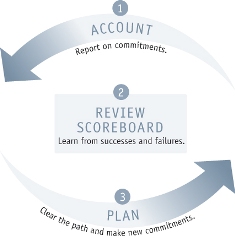 Discipline sustains momentum, over a long period of time, laying the foundations for lasting endurance.
Discipline sustains momentum, over a long period of time, laying the foundations for lasting endurance.
A winning habit starts with 3 Strategic Disciplines: Priority, Metrics, and Meeting Rhythms. Forecasting, accountability, individual, and team performance improve dramatically.
Meeting Rhythms achieve a disciplined focus on performance metrics to drive growth.
Let Positioning Systems help your business achieve these outcomes on the Four most Important Decisions your business faces:
|
DECISION |
RESULT/OUTCOME |
|
PEOPLE |
|
|
STRATEGY |
|
|
EXECUTION |
|
|
CASH |
|
Positioning Systems helps mid-sized ($5M - $500M+) businesses Scale-UP. We align your business to focus on Your One Thing! Contact dwick@positioningsystems.com to Scale Up your business! Take our Four Decisions Needs Assessment to discover how your business measures against other Scaled Up companies. We’ll contact you.
NEXT BLOG – The Captain Class – Surprising Insights on Leadership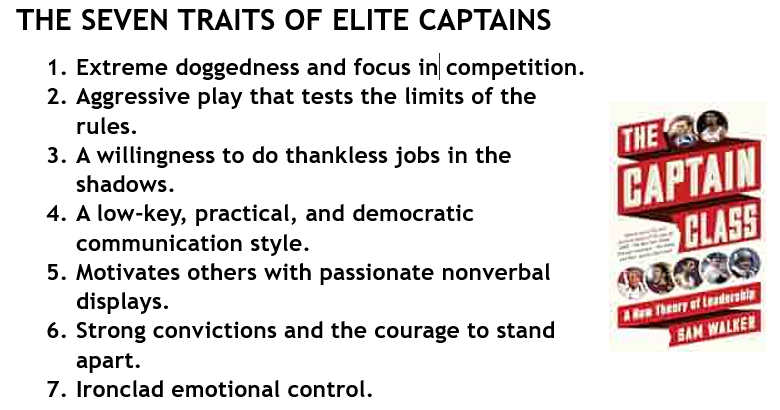






.jpeg?width=150&height=135&name=Hand%20with%20marker%20writing%20the%20question%20Whats%20Next_%20(1).jpeg)

